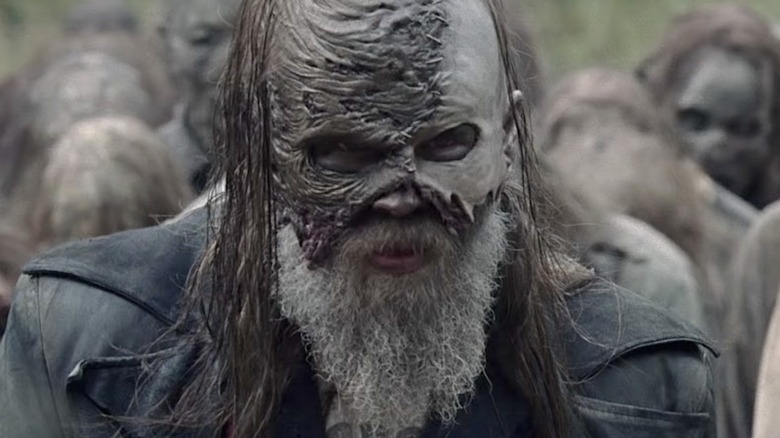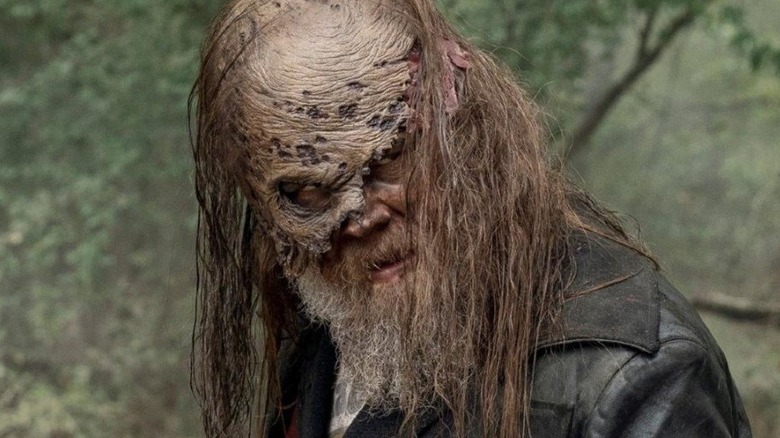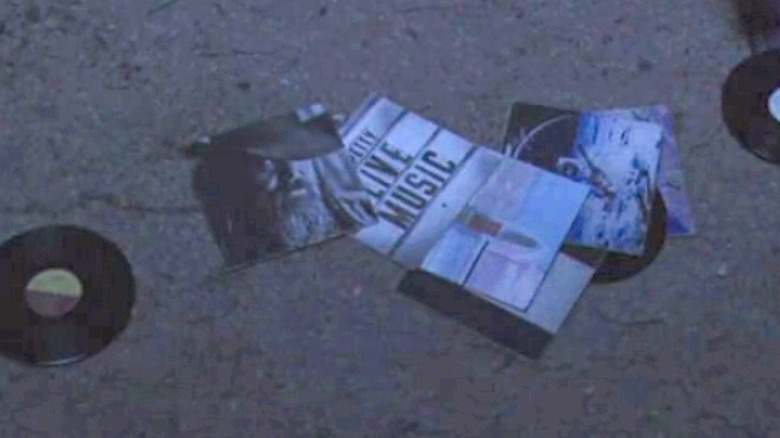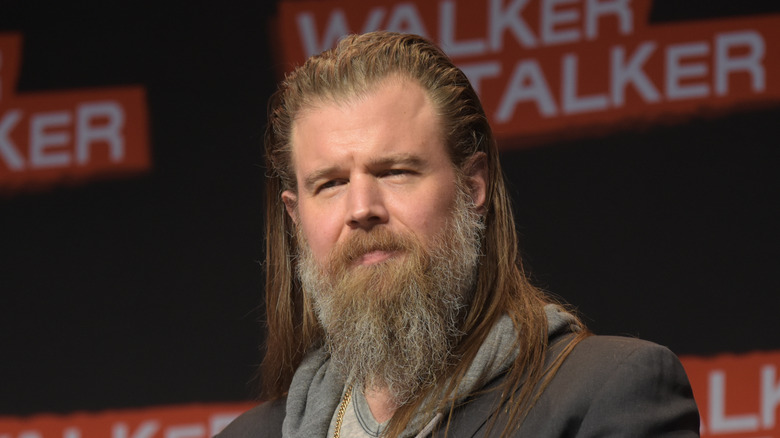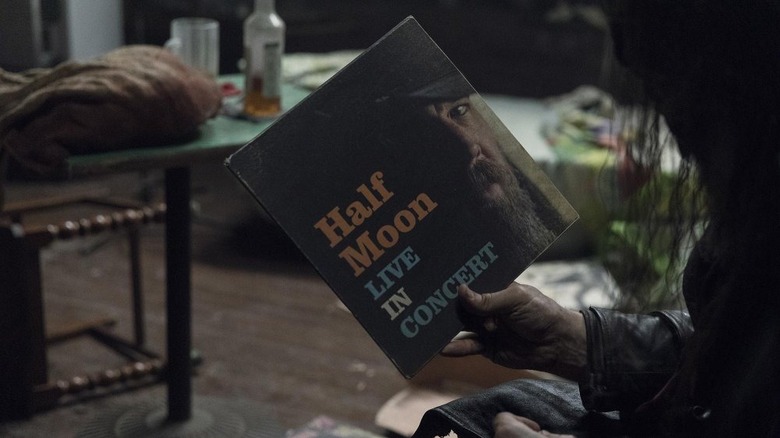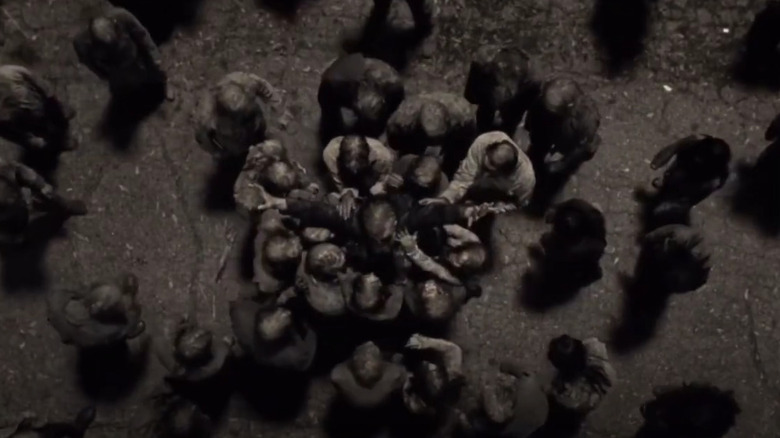Who Was Beta In The Walking Dead? His True Identity & Tragic Fate Explained
From the baseball bat-wielding Negan (Jeffrey Dean Morgan) and jealousy-ridden Shane Walsh (Jon Bernthal) to the utterly unhinged Governor (David Morrissey), "The Walking Dead" isn't exactly short of terrifying antagonists. Even so, Beta (Ryan Hurst) manages to stand out. The second-in-command of the eerie Whisperers faction, he's a hulking man whose face is constantly covered by a half-mask made from the skin of his dead friend, with a mental state and fighting skills that fit his monstrous visage.
Beta is a fairly late-game antagonist in the entire "Walking Dead" timeline. While he's technically never the big bad of a season, he's nevertheless one of the most memorable and dangerous figures of "The Walking Dead" Season 9 and Season 10. Here's a closer look at the character and what makes him so terrifying.
Beta is one of The Walking Dead's scariest monsters
Beta is a perfect storm of an unpredictable antagonist. As a high-ranking member of the Whisperers — a faction that has learned to disguise and mask their scent well enough to walk among the walkers — he sympathizes and interacts with the walking dead. He's a fast, strong, and brutal warrior, a loyal minion and confidant of Alpha (Samantha Morton), and clever enough to cause plenty of problems to his enemies.
The only reason Beta isn't a bigger threat is that he voluntarily occupies a lieutenant role and lets the weaker but more collected Alpha lead. However, he's not without his weaknesses. Beta is an extremely violent and volatile person, and after Alpha's death, he's thrust into a reluctant leadership role that's too much for his psyche.
All in all, this is a character who's physically and intellectually formidable, utterly savage, and just off enough to add to his aura of constant threat. Combine this with his rapport with the walkers, and Beta ticks just about every monster box "The Walking Dead" has to offer.
The Walking Dead's Beta was a very different man before apocalypse
Beta might seem like a scary guy, but before civilization fell, he was something completely different. In fact, when he's unmasked on the show, Negan is uncharacteristically shocked to recognize him. The reason behind Negan's surprise isn't elaborated upon, but the implication seems to be that Beta was a well-known guy before the dead started walking. The show is peppered with clues about his pre-apocalyptic life, which eventually reveal that he used to be a well-known country musician known as Half Moon. While the Beta Easter eggs on "The Walking Dead" lead the viewer toward the revelation, finding out who he really is tends to be bad news. The fiercely private antagonist has even been known to kill fellow Whisperers if they learn his true identity.
The comic series is even more explicit about Beta's status as a former celebrity, though the nature of his fame is different in the source material. When he loses his skin mask, eyewitnesses immediately recognize him as an extremely famous basketball star, which goes a long way toward explaining his gigantic size and physical prowess. However, Ryan Hurst wasn't impressed by this backstory. Instead, he came up with and successfully pitched the country musician angle, which the show embraced so thoroughly that Hurst even recorded some music for the show. The country music backstory even means that "The Walking Dead" fans eventually got to see Beta's real face on his old album covers — such as the one seen on "Fear the Walking Dead" Season 5, Episode 14, which shows the maskless Beta scowling at the camera.
Who played Beta on The Walking Dead?
The face of the actor playing Beta on "The Walking Dead" might be hidden under a gruesome mask, but he's quite familiar from a number of movies and shows. Ryan Hurst is probably best known for his role as major character Harry "Opie" Winston on "Sons of Anarchy," but he's also played notable roles on shows like "Wanted," "King & Maxwell," "Bosch," "Bates Motel," "The Mysterious Benedict Society," and "S.W.A.T."
On the movie front, his track record includes playing tragic high school athlete Gerry Bertier in the Denzel Washington sports biopic "Remember the Titans" and Sgt. Ernie Savage in "We Were Soldiers." Along with his on-screen roles, Hurst is also a talented voice actor. Video game enthusiasts may recognize him from "God of War Ragnarök," in which he provides the voice of the antagonistic thunder god Thor.
The main differences between Beta in The Walking Dead comic & TV show
Beta's real identity on "The Walking Dead" is obviously one of the biggest differences between the show and the comic, but it's far from the only one. The manner of his death — more on that in a second — is somewhat different. The comic book Beta is also a lot cooler and more composed than the show's version, and looks far less disheveled. If he wasn't 7 feet tall and didn't wear a skin mask at all times, he'd almost come across as a fairly regular guy as opposed to the hairy, biker-looking show incarnation.
In an interview with Entertainment Weekly, showrunner Angela Kang confirmed that the changes to the character were partially because Ryan Hurst simply didn't come across as a basketballer and partially because the actor came up with the country musician idea. However, despite the changes, she said that Beta's core as a character — a former celebrity who has given in to his evil side — translated to the screen well.
"I think the aspect of it that was kind of important is he was this famous guy and he had this dark side that kind of came out in the apocalypse," Kang said. "So we worked on this backstory and then just thought it'd be really fun to have this musical figure and we were sort of looking for reference and that was what we were pulling on. And just the idea that even before the apocalypse there was a part of him that he kind of kept hidden at times."
Beta's fate at the end of The Walking Dead is worse than death - but not for him
Beta meets his fate on "The Walking Dead" Season 10, Episode 16 — "A Certain Doom." At this point, the war between the Coalition and the Whisperers is nearing its end, and Beta is in such a bad mental place that he believes a horde of walkers is communicating with him. His preoccupation with the undead leaves him unprepared for Negan and Daryl Dixon (Norman Reedus), who manages to catch him by surprise and stab him in the eyes, a bloody scene that causes the surrounding walkers to attack him. However, Beta's hallucinations cause him to believe that they're welcoming and embracing him, and he's eaten alive with a content smile on his face. It's a horrifying fate, but the character himself doesn't seem to mind.
This gruesome fate is significantly different from Beta's death in the "Walking Dead" comic series, where the antagonist attempts to ambush Paul "Jesus" Monroe and Aaron, but isn't quite stealthy enough, and Aaron shoots him in the ensuing battle. In an interview with Entertainment Weekly, Ryan Hurst revealed that he contributed to the idea of allowing the character to perish peacefully, which he says was inspired by Thich Quang Duc, a monk who famously self-immolated in 1963 to protest the Vietnam War.
"Being a fan of the show, we've seen so many deaths where there's people screaming and ripped apart," Hurst said. "I was just like, as a fan, I wanted to see somebody have a slow, peaceful tearing apart, and it felt very organic to throw that out there. And they said that they loved it. So after he gets stabbed in the face is after that, him just being slowly welcoming, very peacefully welcoming death was very, very sweet."
